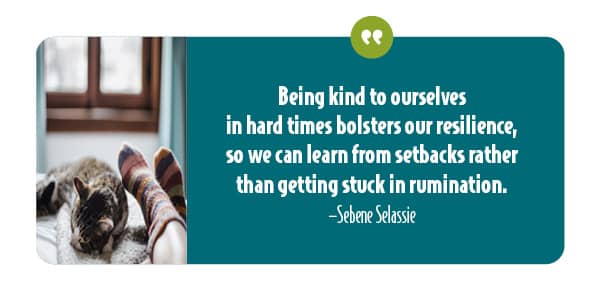We are all still adjusting to post-pandemic and building more forward momentum. Regardless of what challenges you face, resiliency is critical. When confronted with tragic world events coupled with personal challenges of our own, life can seem overwhelming. Learning emotional intelligence skills will help, grounding you in inner peace and well-being despite stressful times. When dealing with uncertainty, worry, and anxiety, you will be glad you have a life jacket keeping you afloat in the turbulent waters of emotions.
Estimated reading time: 4.5 minutes
 Self-compassion is at the top of the list for cultivating inner peace.
Self-compassion is at the top of the list for cultivating inner peace.
Many times, we exacerbate negative feelings by trying to deny them. Or we become overwhelmed by worry. Or if we do feel our emotions, sometimes we judge ourselves for not having it together more. Don’t! Concern, anxiousness, and even a ripple of panic are natural responses of your brain attempting to keep you safe! Be extra kind and gentle with yourself.
No matter what you feel, it’s okay. By acknowledging your feelings, they’re less likely to intensify or get out of control. Added stress often results from denying what is happening in our lives. You may want something different; however, acceptance and looking squarely at what is, allow us to walk forward with more confidence. Science shows that kindness and empathy boost our immune system while negative emotions lower our immune response. Be kind and compassionate to yourself and others. It's an action that will help everyone.
Science shows that kindness and empathy boost our immune system while negative emotions lower our immune response. Be kind and compassionate to yourself and others. It's an action that will help everyone.
We can ease the stress and turbulence of our lives by leaning into compassion for ourselves and others.
Act on the things you can control to help overcome anxiety and increase resiliency.
Our brains are wired for spotting threats and surviving (important, I'm sure you'd agree!). Therefore, keep your thoughts in check. Don’t allow your mind to be a runaway train repeatedly churning worst-case scenarios or allowing your Inner Critic to take charge.
If you do get on an anxious track, interrupt it. Thoughts create emotions; if you want to feel calmer, change your thoughts. (We make better decisions when we’re calm since we’re more capable of accessing the logical part of the brain.)

It’s helpful to shift our minds by using our imagination or connecting with memories of safety and happiness.
The unconscious part of our brain doesn’t know the difference between reality and imagination. This knowledge gives us an edge when utilized thoughtfully. By getting in touch with a happy memory or visualizing a positive experience or outcome, your body will begin to release neurotransmitters that counteract the stress hormones.
So, if you find yourself stressed out and anxious: breathe deeply and then use your imagination to create positive emotions. This imagery can be a happy reunion with someone you love, a loved one holding you tightly in an embrace, an exhilarating hike in the mountains, or a relaxing getaway on a warm ocean beach. With travel curtailed, imagery is the safest way for a getaway!
Do things you CAN control: love your kids, exercise, listen to soothing music, or read an uplifting book to give your mind a break. By doing things you DO have control over, you’ll feel a little bit better. Activities that are soothing and nurturing will offset the encroaching anxiousness.

Another thing you can control is your perspective. It’s not what happens; it’s our perspective and how we respond to what happens that holds the greatest power. How can you shift your perspective to view this challenge from a place of realism while also keeping yourself encouraged and calmer?
Dr. Luana Marques, an anxiety specialist at Harvard and a licensed clinical psychologist in Massachusetts, gives this advice when feeling anxious:

Grab a couple of ice cubes and hold one in each of your hands. Doing this simple action brings down anxiety and cools the brain.
Increase self-awareness, emotional modulation, and mindfulness.
In stressful times, emotional intelligence is paramount. Increasing your mindfulness and enhancing awareness of your thoughts and emotions will go a long way in helping you regulate tough emotions. At times of high stress, our Threat System is activated, and we need to engage our Soothing System.For a deeper dive, check out our Heartmanity blog: “Why Should You Care About Emotional Regulation?”

Deep breathing is beneficial for calming because when the Threat System is in gear, we tend to breathe shallower and faster. Slow, deep breathing will help you calm even when your mind is whirling.
Breathe in peace. Breathe out anxiety.
Breathe in safety. Breathe out stress.
Breathe in kindness. Breathe out fear.
You don’t need an hour of meditation to be more mindful although meditation has been found to be greatly beneficial. Being fully present at whatever you’re doing, no matter how mundane, is very restful for our minds and calming to our emotions.
For example, when washing dishes, feel the warmth of the water. Listen to the gentle stream of water as you rinse the dishes. Hear the clang of the cups as you place them in the dishwasher. Absorbing completely into a simple activity, much like a runner’s high, will help you suspend concerns for a few minutes, refreshing you for what is before us.
MINDFULNESS PRACTICE: Another strategy is called Mindful Listening. Stop for 30 seconds. Listen to the unique sounds in your environment: the heater fan, the voices in the next room, the wind blowing outside, the slight hum of the lights, or the clicking of someone typing on their computer. Intensify your focus, noticing all the sounds. Simple. Only 30 seconds. Acts like a good night’s rest for your brain.
EMOTIONAL INTELLIGENCE TIP: For a quick gear shift to slow down your emotions and return you to the rational mind, try our 6-Second Gear Shift. This practice works with engaging the cortex, the logical part of the brain. It's a simple exercise that modulates the emotions and has been found extremely helpful in calming intense feelings such as frustration, anger, and fear.
 Do random acts of kindness for others.
Do random acts of kindness for others.
Targeted kindness can boost our feelings while also supporting others. Social responsibility means giving in ways that are right for you, which is also an integral part of building community. Kindness and caring are a win for all.
Our true power does not lie in avoiding problems or challenges; it lies in the confidence of facing them and helping others along the way.
For personalized coaching or to learn more about our Heartmanity programs, contact us at support@heartmanity.com.
And if you want to dig in and learn about emotional intelligence and hone your skills, now you can in an easy, practical way. Check out our online emotional intelligence course.
Maybe you've realized for quite some time that you have emotional sensitivity or you're too emotional and it's getting in the way of healthy relationships. Or perhaps you don't have a clue how to feel or to self-soothe. Time to invest in yourself. There is no time like now to become a better version of yourself. Becoming emotionally fit is a big part of creating a life and relationships you love and gaining inner peace. Trust me, I had to build emotional intelligence from scratch!










